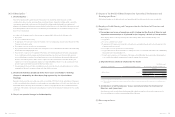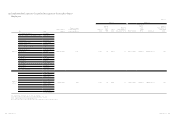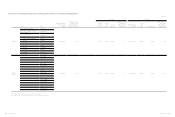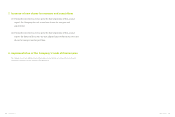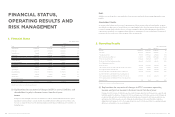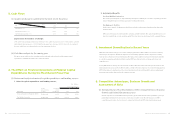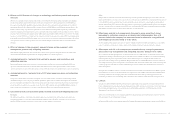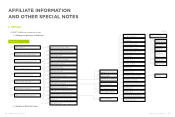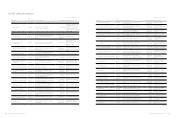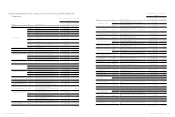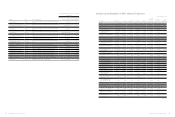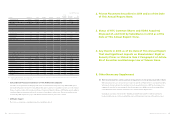HTC 2014 Annual Report Download - page 69
Download and view the complete annual report
Please find page 69 of the 2014 HTC annual report below. You can navigate through the pages in the report by either clicking on the pages listed below, or by using the keyword search tool below to find specific information within the annual report.• Financial status, operating results and risk management Financial status, operating results and risk management •
134 135
HTC's revenues are denominated primarily in US dollars (USD) and euros (EUR). Manufacturing costs are denominated
primarily in US dollars. Forex fluctuations have the potential to impact HTC revenues, operating costs and operating
profits. Apart from efficient management of the quality and payment cycles of its foreign currency denominated accounts
receivable, HTC uses forward exchange contracts to minimize its forex risk. At the close of 2014, financial derivatives held
by HTC related to exchange risk were valued at USD267 million, EUR6 million, GBP30 million, JPY5,288.5 million, CNH
44 million and CAD31.5million. Fair value of the derivatives changes as a result of forex fluctuations. A decrease of 1% in
the quoted exchange rate of any one of the abovementioned currencies against the NT dollar would result in a derivatives
holding loss to HTC of approximately NT$68.437 million.
During 2014, the euro appreciated against the NT dollar from 1:41to 1:42, and then depreciated to 1:38. The US dollar
appreciated from 1:29.9 against the NT dollar to approximately 1:31.7. Net exchange income earned during 2014 totaled
NT$1,097.5 million. Under effective management by the Company, negative effects of exchange rate fluctuations on
profits in recent years have been minimal.
Inflation in Taiwan was approximately 1.2% in 2014. Inflation rates in North American and European markets were also
relatively negligible. Overall, inflation had no significant impact on HTC profits.
2. Risks associated with high-risk/high-leveraged investment; lending, endorsements,
guarantees for other parties and financial derivative transactions
HTC does not engage in high-risk ventures or highly leveraged investments. Loaning of funds takes place only between
HTC subsidiaries. All such arrangements must be reviewed and approved by the board of directors in accordance with
the Operational Procedures for Fund Lending and Rules for Endorsements and Guarantees. HTC engages in derivative
products trading only to mitigate forex risks arising from foreign currency assets and liabilities. All derivative trading is
conducted according to stipulations written in the Procedures for Acquisition or Disposal of Assets.
3. Future R&D plans and anticipated R&D expenditures
The Company's R&D programs for the most recent fiscal year primarily focus on research and development of
applications related to the user experience and mobile data services, and on providing product-related technical support
and after-sales service.
In addition to further developing its existing smartphone product line, the Company will continue to research and develop
technologies that enhance the user experience, such as wide-angle front camera technologies that allow users to have an
ever-more perfect self-shooting experience by enabling the lens to image a broader background. The Duo Camera boasts a
depth sensor that enables a wide range of beautiful images and better user experiences. The high efficiency, low distortion
headphone amplifiers and built-in speakers make the sound even more stunning. Developing and enhancing all new Smart
Sensor Hub provide users new and more intuitive user experiences and provide more health information by improving
fitness and sport application through the full integration with HTC BlinkFeed™ . HTC is also exploring dual card, dual
mode capabilities that permit dual card users to answer incoming calls whether surfing the Internet or downloading
information, while the phone smoothly juggles all the necessary systems. Through HTC's advanced technologies users
will continue to enjoy richer, more personalized mobile phone experiences. In addition, through more open developing
functions and environments (HTCDev), developers from all over the world can utilize the powerful hardware/software
functions of HTC smartphone such as strong computing processor, best camera and sound effects, smart sensor, best HTC
Sense™ and HTC BlinkFeed to develop applications that enable users to have more and best user experiences.
In early 2015, HTC announced strategic partnerships with the world-renowned sports company Under Armor Inc. and the
legendary game developer Valve Corporation. Through these alliances, HTC underlined its diversification strategy with
new connected lifestyle products. HTC joined MWC to announce deepened partnership with the world-renowned sports
company Under Armor® and game developer Valve. Through strategic alliance, they announced launch of products such
as HTC Grip™ and HTC Vive™ . By integrating with UA Record, a new social platform on sports technology, HTC Grip,
the first wearable device from HTC, will offer athletes and sport-lovers complete and detailed data from sport analysis,
which will see another full integration of experiences again for smart phones and wearable devices. HTV Vive is a head-
worn virtual reality device developed together for the first time by HTC and the world's top-notch game developer Valve
Corporation. This device offered an opportunity for HTC and Valve to join together in expanding the market for virtual
reality. It is expected that HTC Vive will be able to change how human interact with technology and the world by offering a
new way for these interactions.
Starting 2014, HTC has devoted a lot of resources on developing R&D talents and technological innovations, with a current
count for R&D staffs representing close to 30% of the total worldwide staff count. Its investment on R&D resources
represents approximately 7% of its operating income. In 2014, it set up a department for IoT Engineering, and it will
continue to devote more R&D resources on various new products and technologies. In the future, virtual reality, wearables
and IoT devices will be the focus, in addition to continuous innovation on major smart handheld products and continued
refinement on user experiences. This signifies that HTC will offer a future product line that is rich with selections and
closely match users' needs by penetrating into everyone's daily life and providing more information to the users. These
smart products and technologies will also push the HTC brand to a higher position, further strengthening the company's
long-term competitiveness.
4. Effects of domestic / foreign government policies and regulations on HTC finances
and response measures
The Financial Supervisory Committee (FSC) of the Executive Yuan has required all listed companies in Taiwan to prepare
financial statements in accordance with the International Financial Reporting Standards (IFRSs) starting from January
1, 2013. HTC has established an IFRSs project team and has launched the project plan for its IFRSs adoption. In addition,
the progress of such adoption is regularly reported to the Board.
As of December 31, 2012, all potential significant difference between IFRSs and current accounting policy had been
identified. Full disclosure of the IFRSs main content and implementation status were included in the footnote of the 2011
annual consolidated financial statements and the 2012 interim and annual consolidated financial statements. Starting
from 2013, HTC has prepared financial statements in accordance with IFRSs.
The Taiwan "National Health Insurance Act" was amended on January 26, 2011, to create an obligation to fund the health
insurance scheme by paying an extra 2% "supplementary premium" (based on 2% of the total profit sharing and variable
bonus) plus the basic premium charge. Such extra 2% "supplementary premium" will be incurred in connection with
future payouts of profit sharing and variable bonus and increase the operation cost of the Company. HTC has studied the
implications of this new amendment and has taken the necessary managerial precautionary steps with respect to such
amendment.


